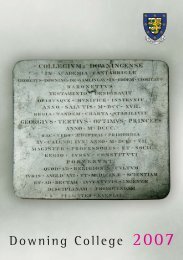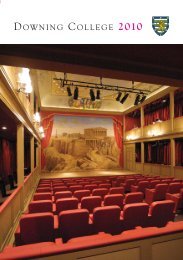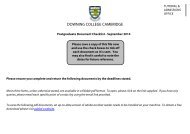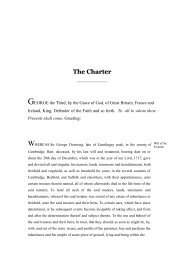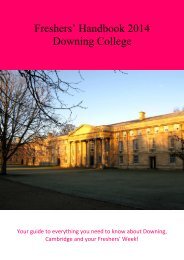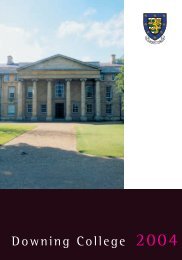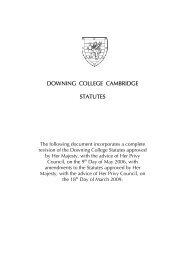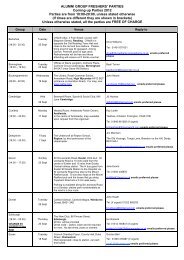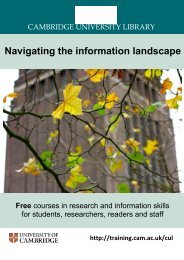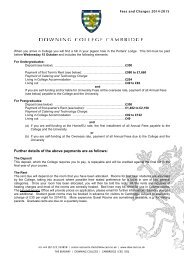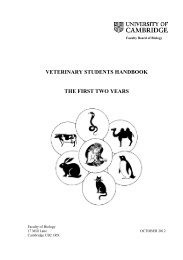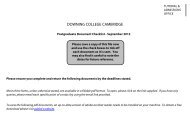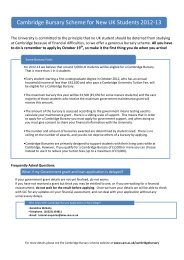downing text 2012_Layout 1 - Downing College - University of ...
downing text 2012_Layout 1 - Downing College - University of ...
downing text 2012_Layout 1 - Downing College - University of ...
- No tags were found...
Create successful ePaper yourself
Turn your PDF publications into a flip-book with our unique Google optimized e-Paper software.
DOWNING COLLEGE ASSOCIATIONrequired full-time nursing care. A suitable home was located in Felixstowe, butsadly his condition deteriorated very rapidly: he died peacefully on 14 January.John Gordon Coates DSO (1937) died on 25th December 2006 aged 88. Heread Modern Languages. The following obituary was submitted by FrancesCooley and supplements an account <strong>of</strong> his wartime activities given in <strong>Downing</strong>and the two World Wars.John Coates, who read Modern Languages at <strong>Downing</strong> (principally Germanand French) from 1937, was born in 1918 in Acomb near York. He was at schoolat Abbotsholme on the Staffordshire-Derbyshire border. His parents – his motherwas a pr<strong>of</strong>essional singer, his father a commercial traveller – were self-educated.On completing his degree in 1940 he was called up, initially into the RoyalArmy Medical Corps as a conscientious objector. He served thirteen months inthe ranks including <strong>of</strong>ficer training. Selected largely because <strong>of</strong> his knowledge<strong>of</strong> German, which was excellent, and commissioned in the Intelligence Corps,he was with 10 (Inter-Allied) Commando in North Wales and active with 30Commando in Italy and Corsica. In 1944 he joined SOE (Special OperationsExecutive) and was parachuted into Hungary at the head <strong>of</strong> a three-man mission.Lured into a trap, the entire party was captured. After three months in differentprisons within Hungary they escaped. Coates was subsequently awarded a DSOfor his courage, skill and leadership. He finished the war a Major.On the cessation <strong>of</strong> hostilities, Coates had attachments in Prague, and thenback in Budapest, still with SOE, principally to recompense Hungarians andothers who, at great risk to themselves, had helped the allied effort. His finalposting was to Germany. Following the war, Coates joined the BritishDiplomatic Service returning to Cambridge in 1949–50 to take the Tripos Part1 in Russian. His diplomatic postings included The Hague, Vienna, Moscowand finally Helsinki where he was First Secretary in Chancery.In 1962 he took early retirement from the Foreign Office and accepted the<strong>of</strong>fer <strong>of</strong> the post <strong>of</strong> Assistant Pr<strong>of</strong>essor at the <strong>University</strong> <strong>of</strong> Idaho, USA, teachingRussian, <strong>of</strong> which he was in sole charge, and German. The following year hereturned to Cambridge, and once again to <strong>Downing</strong>, to teach on Pr<strong>of</strong>essor Hill’sintensive Russian courses, as well as elsewhere, and to register as a researchstudent with a desk at the Scott Polar Research Institute. By this time hislanguages included Hungarian and Finnish and the subject he selected was theKomi, a Finno-Ugrian people in the northern European part <strong>of</strong> the then USSRand their modern literature.Obliged, through lack <strong>of</strong> funds, to go back into full employment, he joinedthe Secretariat <strong>of</strong> the Royal Society, Burlington House, in charge <strong>of</strong> scientificexchanges with Eastern Europe, the USSR and China. This, incidentally, stood63



